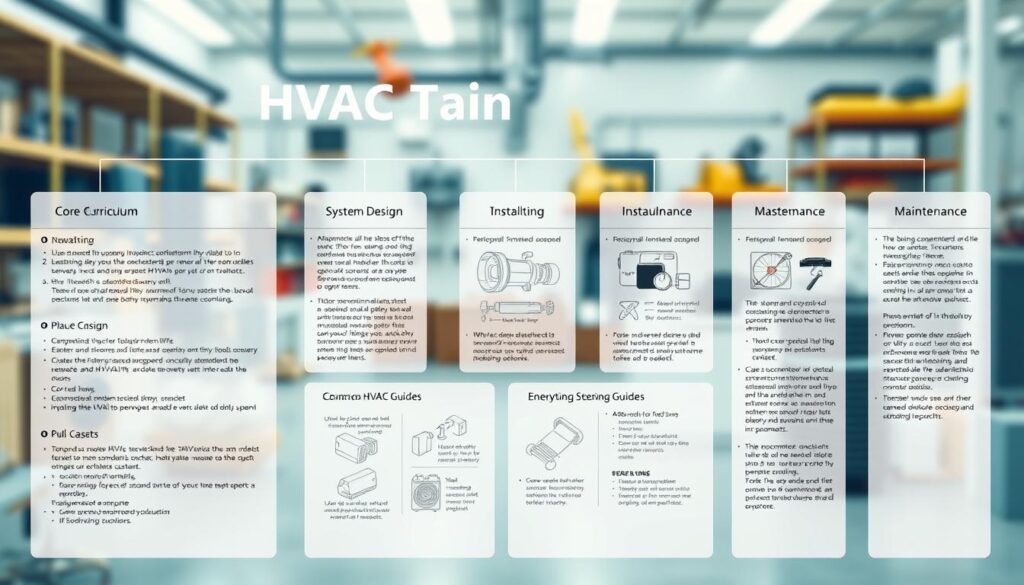Affiliate Disclosure
HVAC Guide Guys is a participant in the Amazon Services LLC Associates Program, an affiliate advertising program designed to provide a means for sites to earn advertising fees by advertising and linking to Amazon.
How to Get HVAC Certification Online? Today’s online HVAC training mixes theory with hands-on skills. It’s perfect for starting a new career or improving your current skills. HVAC certification online is a flexible way to grow professionally.

The HVAC industry is full of exciting career paths for those ready to learn. Now, you can get certified in heating, ventilation, and air conditioning online. This makes it easier than ever to move up in your career from home.
HVAC technicians are in high demand across the U.S. Online training helps you learn the skills needed to join this field. You’ll study important topics like refrigeration, electrical parts, and environmental rules.
Key Takeaways
- Online HVAC certification offers flexible learning options
- Programs combine theoretical and practical technical training
- Career opportunities exist in residential and commercial sectors
- Certification enhances professional credibility
- Programs accommodate various learning schedules
Table of Contents
Understanding the Fundamentals of Online HVAC Certification
Online HVAC programs offer great chances for those starting a career in heating, ventilation, air conditioning, and refrigeration. These digital courses have changed HVAC education. Now, getting professional training is easier than ever.
Types of Available Online HVAC Programs
There are many online training options for HVAC education. They fit different career goals:
- Entry-level certificate programs
- Associate degree in HVACR training
- Advanced specialization courses
- Professional certification programs
Benefits of Online HVAC Training
Online HVAC programs have big advantages over traditional classes:
- Flexible scheduling for those who work
- Learning is more affordable
- Study at your own pace
- Get lessons from experts all over the country
Core Components of HVAC Education
Good online HVAC programs cover key technical areas for success:
- Heating system basics
- Air conditioning basics
- Refrigeration tech
- Electrical systems and troubleshooting
- Learning about energy efficiency
Choosing an accredited online HVAC program means you get top-notch, recognized training. It prepares you for real-world challenges.
Essential Prerequisites for HVAC Online Training
Starting an online HVAC training journey needs careful preparation. You must understand the specific HVAC prerequisites. These requirements are key to your success in these programs.
Before starting online learning, you must meet several important requirements. These are designed to help you succeed in your HVAC certification journey.
Educational Background Essentials
Most HVAC training programs require certain educational qualifications:
- High school diploma or equivalent (GED)
- Minimum age requirement of 18 years
- Basic math and reading comprehension skills
Technical Skills and Equipment Preparation
Successful HVAC online training requires specific technical readiness:
- Basic understanding of mechanical systems
- Fundamental knowledge of electrical concepts
- Physical fitness for potential hands-on training components
Computer and Technology Requirements
To participate effectively in online HVAC learning, you’ll need:
- Reliable high-speed internet connection
- Modern computer with webcam and microphone
- Minimum system specifications:
- Windows 10 or Mac OS (recent versions)
- 4GB RAM or higher
- Processor: Intel i3 or equivalent
Preparing these HVAC prerequisites will set you up for success in online learning. It will help you turn your career dreams into reality.
Explore Our HVAC Shop
Looking for top-rated HVAC tools, parts, and accessories? Visit our shop and find the perfect solution for your needs.
Visit the ShopHow to Get HVAC Certification Online
Getting an online HVAC certificate needs careful planning and steps. The process involves several stages to boost your career in heating, ventilation, and air conditioning.
To start, research accredited online HVAC training programs. Look for ones with a full curriculum that covers:
- Technical theory and fundamentals
- Practical skill development
- Industry-standard equipment training
- State-specific certification requirements
When picking an online HVAC certification program, consider these important factors:
- Verify program accreditation
- Check instructor credentials
- Review curriculum depth
- Understand hands-on training components
- Confirm exam preparation resources
Each state has its own certification rules. For example, California requires completing an approved HVAC program and passing specific state exams. Your chosen program should guide you on meeting these standards.
Online HVAC certificate programs often include virtual labs, videos, and interactive modules. These help you practice real-world skills. Some programs also offer in-person training to ensure you’re fully prepared.
“Success in the HVAC industry starts with a solid educational foundation” – HVAC Professional Association
Plan to spend between $1,000 and $5,000 on a quality online HVAC certification program. Many schools offer flexible payment plans and financial aid to help you grow professionally.
Popular Online HVAC Training Platforms and Programs
Finding the right online HVAC school can be tough. To start your HVAC career, you need to pick the best training platform. This section looks at top online HVAC certification programs to help you begin.
Accredited Online HVAC Schools
Choosing an accredited online HVAC school is key for your career. Good schools give you the training you need to meet industry standards.
- Penn Foster Career School – Offers flexible online HVAC certification programs
- HVAC Learning Solutions – Provides specialized online training modules
- Cold Air Heating & Cooling Training – Comprehensive digital learning platform
Industry-Recognized Certification Programs
Getting credible certifications is crucial for your HVAC career. Top programs prove your skills and make you more employable.
| Certification Program | Duration | Cost Range |
|---|---|---|
| NATE Certification | 3-6 months | $150-$300 |
| HVAC Excellence | 4-8 months | $200-$450 |
| SkillCat Online Training | 2-4 months | Free to $150 |
Cost Comparison of Different Programs
When choosing online HVAC certification programs, cost matters. Free or low-cost options like SkillCat can give you a good start. But, more detailed programs offer deeper knowledge.
Pro Tip: Always check if your chosen online HVAC school is accredited and recognized by the industry before spending time and money.
Investing in a quality online HVAC training program can greatly improve your career in the HVAC field.
EPA 608 Certification Requirements and Process
If you want to work in HVAC, getting the EPA 608 certification is key. It shows you know how to handle refrigerants safely and legally. This is important for working on different HVAC systems.
The EPA 608 certification proves you know about refrigerant management and protecting the environment. HVAC pros need to follow rules for handling refrigerants. This keeps equipment and the environment safe.
- Covers safe refrigerant management techniques
- Required for all technicians working with refrigeration equipment
- Ensures compliance with federal environmental regulations
There are four main types of EPA 608 certification:
- Type I: Small appliances
- Type II: High-pressure appliances
- Type III: Low-pressure appliances
- Type IV: Universal certification
To get your EPA 608 certification, you need to study and pass a test. Many online courses are available, costing between $10 and $50.
“Proper refrigerant handling is not just a skill, it’s an environmental responsibility.” – EPA Guidelines
When studying for the EPA 608 exam, learn about refrigerant recovery, leak detection, and environmental laws. Online resources like SkillCat offer study materials and practice tests to help you pass.
Explore Our HVAC Shop
Looking for top-rated HVAC tools, parts, and accessories? Visit our shop and find the perfect solution for your needs.
Visit the ShopCore Curriculum and Course Structure
Your journey into HVAC technical training starts with a detailed curriculum. It’s designed to turn you into a skilled professional. The HVAC course curriculum mixes theory with practical skills needed for the heating, ventilation, and air conditioning field.

Professional HVAC training covers many key topics to get you ready for real-world tasks. The curriculum is made to give you deep theoretical knowledge and hands-on technical skills.
HVAC Fundamentals and Theory
The heart of your HVAC training is about the essential theoretical basics:
- Thermodynamics principles
- Refrigeration cycles
- Electrical system fundamentals
- Heat transfer mechanisms
- System design and load calculations
Practical Skills Development
Your learning isn’t just about books. The HVAC course curriculum also focuses on practical skills through:
- Virtual laboratory simulations
- Interactive diagnostic exercises
- Equipment troubleshooting scenarios
- Installation and maintenance techniques
Advanced Technical Training
As you move forward, the program explores specialized HVAC areas, including:
- Commercial HVAC system design
- Energy efficiency strategies
- Building automation systems
- Advanced refrigeration technologies
By finishing this detailed curriculum, you’ll get the knowledge and skills to shine in the HVAC industry. You’ll be set for a successful and fulfilling career.
Hands-on Training Components in Online Programs
Online HVAC certification programs know how key hands-on experience is. They give you a solid base in theory, but you need to get your hands dirty to really learn. This is how you become an expert.
Your online HVAC training will use new ways to help you learn:
- Virtual simulation software that mimics real-world HVAC system scenarios
- Augmented reality experiences for equipment diagnostics
- At-home lab kits for physical equipment interaction
- Remote interactive workshops with professional instructors
Online learning can now include real-world practice. Modern programs mix theory with practice through special modules. These immersive techniques let you practice complex HVAC troubleshooting and repair techniques from your own workspace.
To get the most out of your training, think about adding:
- Local apprenticeship opportunities
- Part-time internships in HVAC companies
- Community college workshop collaborations
- Professional mentorship programs
By using different learning methods, online HVAC certification programs make sure you’re ready for the job. You’ll gain the skills and confidence to succeed in this fast-paced field.
Industry Certifications and Career Advancement

To move up in your HVAC career, getting industry certifications is key. These certifications show you’re an expert and open doors to new chances in the field.
Getting the right certifications can really help your career. It can lead to better pay and more job choices. Here’s what you can expect:
- Higher salary potential
- Increased job marketability
- Enhanced technical credibility
- Specialized skill recognition
Some of the top certifications include:
| Certification | Focus Area | Career Impact |
|---|---|---|
| EPA 608 | Refrigerant Handling | Essential for HVAC technicians |
| NATE Certification | Technical Expertise | Demonstrates advanced knowledge |
| HVAC Excellence | Professional Competency | Validates comprehensive skills |
Getting more certifications can make you stand out. Strategic certification planning helps you aim for specific HVAC roles.
“Continuous learning is the key to professional growth in the HVAC industry.” – HVAC Professional Association
Your certification path should match your career dreams. Whether you want to work in homes, offices, or factories, certifications can help.
Explore Our HVAC Shop
Looking for top-rated HVAC tools, parts, and accessories? Visit our shop and find the perfect solution for your needs.
Visit the ShopTimeline and Cost Investment for Online HVAC Certification
Getting an online HVAC certification needs planning in time and money. You’ll look at how long programs last and how much they cost. This is your first step into the HVAC world.
HVAC programs last from 6 months to 2 years. Your choice depends on your goals, schedule, and what you want to achieve in your career.
Program Duration Breakdown
- Certificate Programs: 6-9 months
- Quick entry into the field
- Focused technical training
- Associate Degree Programs: 18-24 months
- Comprehensive curriculum
- Advanced technical skills
Financial Investment Considerations
The cost of HVAC certification varies from $1,200 to $15,000. This depends on the program’s depth and where you study. The benefits include higher pay and more job opportunities.
“Investing in HVAC certification is investing in your future career stability.” – Industry Expert
Payment Options
- Federal financial aid
- Scholarship programs
- Employer tuition reimbursement
- Flexible payment plans
Look into your program’s financial help. This can reduce what you pay upfront and make your education more valuable.
Conclusion
Online HVAC certification is a great way to start a stable and rewarding career. It lets you learn at your own pace, fitting your schedule and goals. This path can really change your career prospects.
Getting certified in HVAC brings many benefits. You’ll learn from top programs and be ready for real-world challenges. The HVAC industry is growing fast, with more jobs for skilled technicians.
To succeed, mix online learning with hands-on experience. Learn key technical skills, get certified, and keep learning. The HVAC industry values those who are passionate and skilled.
Ready to move forward? Look for online HVAC programs that are accredited. Explore your certification options and get ready for a career that’s stable, growing, and fulfilling. You’ll help keep communities comfortable and efficient in the United States.

